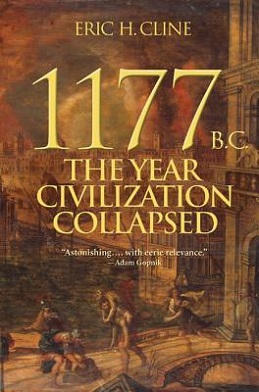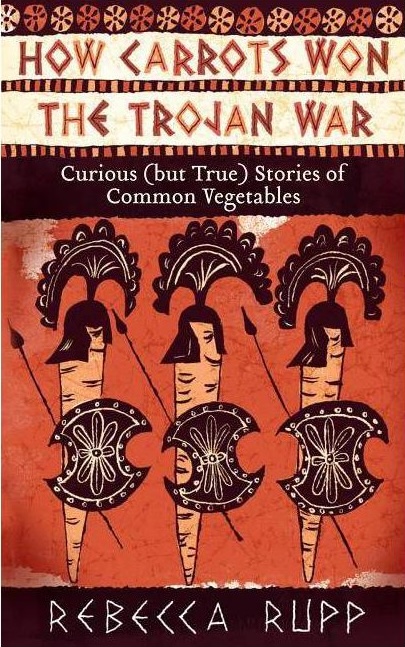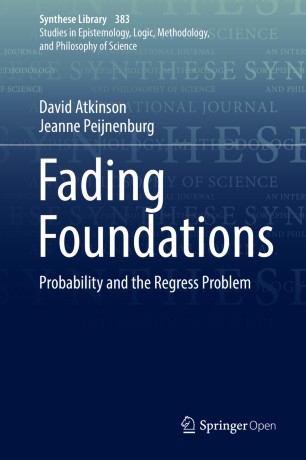Interesting Books I've Read in 2022
∷
Books: 2025 - 2024 - 2023 - 2022 - 2021 - 2020 - 2019 - 2018
Below are some interesting books I’ve read in 2022. In past years, I’ve offered three recommendations; however, this has been a great reading year, so I’m including six. Fading Foundations applies a novel mathematical approach to a perennial problem in epistemology. 1177 B.C. and The Isles detail the histories of the Bronze Age collapse and the British Isles, respectively. How Carrots Won the Trojan War offers some whimsical miscellany about vegetables and their kin. Dr. Jekyll and Mr. Hyde is a cornerstone of nineteenth century Gothic literature. Pythagoras and the Pythagoreans examines the influence of Pythagoreanism on the history of Western thought.
If you have some thoughts on my list or would like to share yours, send me an email at brettcmullins(at)gmail.com. Enjoy the list!
Fading Foundations: Probability and the Regress Problem
Authors: David Atkinson and Jeanne Peijnenburg
Published: 2017
This book introduces the probabilistic approach to the regress problem and synthesizes nearly a decade of work from Atkinson and Peijnenburg. Their work investigates the regress problem through a probabilistic graphical model where vertices are beliefs/propositions and directed edges are relations of support representing conditional probabilities. Within this model, the authors seek to answer the following question: when is an unconditional probability of a potentially infinite chain of conditional probabilities well defined? While informal arguments against infinitism abound, the authors provide compelling formal results demonstrating that infinitism is a possible solution to the regress problem and, to some extent, preferable.
Two intertwined properties emerge from this model: the emergence of justification and fading foundations. We can view an infinite justification structure (chain or loop) as a nested sequence of finite chains. For any finite chain, we can rewrite the unconditional probability of the root proposition as the sum of two terms: the accumulated probability obtained from the conditional probabilities and the residual consisting of the weighted unconditional probability of the proposition at the end of the chain. Under some weak regularity assumptions, as the length of the chain grows, the accumulated probability increases and the residual probability decreases. In the limit, the former increases to the limiting value of the unconditional of the root proposition and the latter decreases to zero. As justification emerges from the accumulated conditional probabilities, the effect of the seemingly foundational unconditional end proposition fades away.
This program started with Infinitism Regained from 2007 which demonstrated that under uniformity assumptions it was possible to “complete” an epistemic chain i.e. calculate an unconditional probability from an infinite sequence of conditional probabilities. The pair published several papers extending this insight. For instance, Justification by Infinite Loops extends the model from chains of conditional probabilities to loops or cycles and The Emergence of Justification introduces the property in its title and provides several examples.
When this book came out in summer 2017, I read bits of it here and there to complement the authors’ several journal articles; however, until reading it in full this year, I didn’t appreciate how much they filled in the gaps between their findings to tell a coherent (but not coherentist) story.
1177 B.C. The Year Civilization Collapsed
Author: Eric H. Cline
Published: 2014
During the Bronze Age, several civilizations flourished in the eastern Mediterranean and Near East; however, with the end of the age came their collapse. Since the mid 19th century, the reigning hypothesis has been that these civilizations were overrun and their cities sacked by roving bands of migrants known as the Sea Peoples. Cline contests this by advancing the systems collapse thesis. This holds that the complex cultural, political, and economic systems experienced cascading failures and were not nimble enough to adjust to the evolving circumstances. This is not unlike the possible cascading failures resulting from bank runs.
While posed as a history book, this is really a book on international relations told primarily through sometimes scant archaeological evidence. While we may think that globalization is a recent phenomenon, Cline convincingly argues that the late Bronze Age civilizations share many of the properties we associate with a globalized world. Here’s an excerpt from a talk of Cline pitching his book:
“Now, no one would argue with the concept that we’re globalized today, that’s the whole idea. I think many would be surprised to consider that back in the Late Bronze Age they were, in their own way, just as globalized—if we think from Italy on one end, to, say, Afghanistan on the other, and Turkey down to Egypt—that world was all interacting. They were trading; they were dependent upon each other. The tin is coming from Afghanistan; the copper is coming from Cyprus; gold is coming via Egypt from Nubia and the Sudan; and everyone is dependent, frankly, on everyone else and when something bad happens to one, it’s going to impact all of the rest or at least the next one and the next one.”

Rather than one single event - a la the Sea Peoples hypothesis - Cline argues that a confluence of factors led to the collapse including earthquakes, famine, power consolidation by states, and fractured international trade routes. While some may find this conclusion deflating, it seems to be a more honest assessment of the evidence available. Similarly, just as Rome did not collapse exactly in 476 CE, 1177 BCE is used as a marker for the collapse which occurred within a window of up to one hundred years from 1250 to 1150 BCE.
While the systems collapse theory is interesting, I found my attention drawn more toward the structure of and relations between the late Bronze Age states. Egypt, the Hittites, Canaan, Mycenaean Greece, and Ugarit among others each get their time in the spotlight. This book complemented well two other fun books I’ve read this year: The Greatest Invention (2022) by Silvia Ferrara and Libraries in the Ancient World (2001) by Lionel Casson. The former is a conversational introduction to deciphering writing systems such as Linear B used in Mycenaean Greece and others from the Bronze Age. The latter is a short survey of how written information was recorded, organized, and stored in Greece, Egypt, and Rome in Antiquity.
The Isles: A History
Author: Norman Davies
Published: 1999
This book is a sweeping narrative of the British Isles. Davies begins by justifying his focus on the geographical region; however, throughout the narrative, other places whether on the European continent or the British overseas territories are introduced. This book is surely not meant as an introductory text and assumes the reader is somewhat - occasionally quite - familiar with the history of the isles and English history in particular. Exemplary of this are the references to Dr. Johnson which neither explain who Samuel Johnson was nor the significance of the reference.

Given the length of this book - just over a thousand pages - Davies shifts his writing style between parts which helps keep the reader engaged and motivated. Chapters can get dreary but seem to perk up when Davies discusses culture which I found to the strongest passages of the book. I particularly enjoyed the bits about Shakespeare and the historicity of Robin Hood.
Peppered throughout the book are interesting methodological and historiographical discussions. For instance, prior in the narrative to the foundation of England, Scotland, and such, Davies uses names for places corresponding to the relevant time period or, none are available, provides his own. Thus, when discussing prehistory, the British Isles become the Midnight Isles (but likely not these Midnight Isles).
One comical criticism is that England dominates much of the discussion, though the author sets out to tell a more balanced tale. I was particularly interested to delve into Ireland, Wales, and Scotland; however, many chapters included only a few passages about these other kingdoms. Surely, this is in part due to a dearth of record keeping outside of England.
How Carrots Won the Trojan War
Author: Rebecca Rupp
Published: 2011
This book is about vegetables and fruits we sometimes call vegetables (which somehow includes watermelons).

The story of each vegetable is a menagerie of etymology, folklore, suspect nutritional findings, historical recipes, offerings from seed dealers, and frequent check-ins with Thomas Jefferson’s exploits at Monticello, among others. Despite this format, the book rarely strays into monotony; instead, the author carefully weaves together these episodes and jumps from one topic to the next without it overstaying its welcome.
My favorite topics: asparagus, cucumbers, and pumpkins. I found myself enjoying sections more on vegetables that I like to eat, an unfortunate bias.
This book features wonderful artwork to start each chapter (in the style of the cover). It is light and fun but not complete fluff. At the least, you’ll both have some trivia on hand and better appreciate the offerings during your next stroll through a farmers’ market. It’s difficult to think of a better book to read to begin the warm seasons.
The Strange Case of Dr. Jekyll and Mr. Hyde
Author: Robert Louis Stevenson
Published: 1886
I don’t often recommend fiction, which I find to be more personal and difficult to discuss than its counterpart. Perhaps, I feel more at ease with Dr. Jekyll and Mr. Hyde, since it is so well known as a trope that the reader can likely piece together an outline of the story without glancing at a page. It could also be that I use Jekyll as a framework for this blog rather than Hyde.

While there are interesting philosophical implications of dialogue between characters to explore, this slim volume doesn’t require the promise of speculation to hook the reader. Though I’m often a slow and plodding sort of reader, I found myself glued to this one until the end taking the better part of an evening.
This book is available for free online from Project Gutenberg and has a nice and reasonably priced printing from Barnes and Noble. I read it with my wife for a Victorian Gothic literature course at The Newberry Library in Chicago.
Pythagoras and the Pythagoreans: A Brief History
Author: Charles H. Kahn
Published: 2001
Pythagoras is a difficult historical figure to survey well. Not only did he not leave behind any writing, but historical accounts of his life often stray into the fantastical. Compounding matters is that many people are familiar with his name either through a certain result in gradeschool mathematics or from the covers of New Age books. What we do know is that Pythagoras was a sixth century Greek philosopher and religious leader who had an immense effect on the development of Western thought.

Charles Kahn’s short book traces the influence of Pythagoreanism from antiquity to the Scientific Revolution. While Kahn is best known for his work on the pre-Socratic philosophers such as Anaximander, this book is at its best when profiling Neopythagoreans in and around Rome during the first and second centuries CE and discussing the influence of Pythagoreans such as the fifth century BCE Greek philosopher Philolaus on the astronomial models of Copernicus and Kepler. Due to its brief nature, however, this book’s coverage is not comprehensive. In particular, Pythagorean thought in the Middle Ages is glossed over with a short discussion of the Neoplatonists.
 Buy me a coffee
Buy me a coffee

